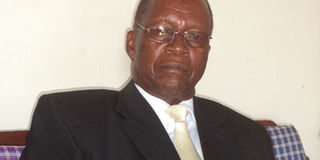Barinyenka passionate about students’ skills

After more than 40 years of teaching, Boniface Barinyenka says discipline has been the core of his career. PHOTO by zadock amanyisa
He was the third best candidate in Ankole Kingdom in the Primary Leaving Examinations in 1963. This was the beginning of an illustrious journey that saw Boniface G.K. Barinyenka, 70, become a teacher and eventually an award-winning head teacher.
His performance attracted full bursary to study from his junior level until Senior Six where he also got a university scholarship to pursue his degree in education at Makerere University.
Barinyenka categorises himself in the 1960s group where head teachers emphasised discipline, core values such as honesty, transparency, hard work, love, professionalism and smartness, among others which are part and parcel of academic excellence.
Background
Barinyenka was born on November 25, 1948 in Kyabugimbi Sub-county, Bushenyi District. He attended Nyakabanga Primary School and St Kagwa Boarding Primary School and Junior School in the years 1958-1965. This was a time when there were very few or no schools. Most schools normally ended at Primary Four and one would look for a better school for upper primary.
And so after primary school, Barinyenka joined Aga Khan Secondary School, Masaka and Old Kampala Secondary School for O and A-Level respectively from 1966 to1971 after which he enrolled for a Bachelors in Education at Makerere University between 1972 and 1975.
Career in teaching
But Barinyenka’s choice of course was not accidental. It was a dream he has conceived following his admiration for his former primary and secondary school teachers including Aloysius Tibunyebire, Henry Mbyemiire (RIP), Aloysius Beingana (RIP) and John Kamp.
“My teachers were smart and exemplary. They made me develop passion for teaching. I later found it reasonably easy because I was confident save for some setbacks such as the death of my parents and political instability,” he narrates.
During his university days, Barinyenka says, the political situation in the country was tense and sometimes, lecturers would run away leaving (students) in lecture rooms.
Humble beginnings
After university in 1975, Barinyenka was posted to Bweranyangi Girls Secondary School where he taught up to 1981 and was appointed the founding head teacher of St. Michael High School Rugazi in Rubirizi District a school he led up to 1986 when he was again appointed the founding head teacher of Sacred Heart Secondary School, Mushanga, in Sheema District. He worked here until 2001.
While at Bweranyangi Girls SS, Barinyenka says times were hard. “I was a graduate working for meagre pay. I earned Shs1,300 which could not sustain a teacher. I walked to work but persevered. In 1986 when life improved, I built my first house,” he recounts.
In 2001, he was transferred to St. Noah Secondary School Mutara-Mitooma District as head teacher where he served for three years before being transferred as deputy head teacher at Ntare School in 2003. He retired in 2009 and joined private service.
The hard worker
In schools where Barinyenka was founding head teacher, he ensured strong foundations built on values were laid to grow these schools into academic powers.
He preached about self-reliance and engaged students in handwork and survival skills where students made bricks and participated in building of school structures.
“Their labour would not be in vain. The students would earn some money which would be top up on their school fees. It was also an exercise to train students that nothing comes easy in life.” he says. After his illustrious career, Barinyenka retired from public service but he was not tired of grooming the country’s children therefore, when the Mbarara Archdiocese Archbishop, His Grace Paul K. Bakyenga asked him to help develop Nyakabanga Secondary School, a Catholic Church founded school, he did not think twice about it. “I could not hesitate,” he says.
Methods of work
To Barinyenka, for education to be transformed, the stakeholders must emphasise team work.
The founding body, parents, teachers, students, local community, and the Education ministry must work together to achieve. “You also need to do close monitoring and inspection if you are to get results,” he asserts.
The retired head teacher is also a family man who is married with six children and nine grandchildren.
He is also an opinion leader and district councillor representing the elderly in Bushenyi District local government council.



